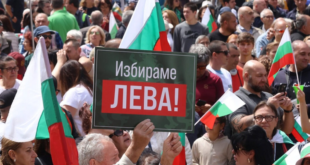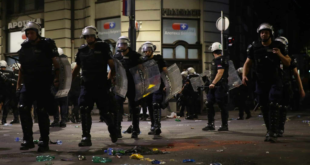Despite grounds for suspicion, prosecutors in North Macedonia are not investigating the country’s link to an illegal marijuana operation in Serbia.
In February this year, prosecutors in Serbia sent a letter to their counterparts in neighbouring North Macedonia requesting their help on an investigation into an illegal marijuana operation discovered in late 2019 just outside the Serbian capital, Belgrade.
The discovery of a sprawling marijuana plantation behind the organic vegetables of the Jovanjica farm has turned into a major embarrassment for Serbia’s government given revelations about the involvement of a number of state security officials.
In the probe that ensued, investigators discovered a custom-made messaging app used by the group behind the operation to discuss their dealings.
One of the chat groups on the app was called ‘Rosoman Manufacturing’, an apparent reference to the municipality of Rosoman an hour’s drive south of the North Macedonia capital, Skopje, and where the chief suspect in Serbia, Predrag Koluvija, was part-owner of a company called THC Quality Group. The company had a licence to produce cannabis for medicinal use.
“Inside this chat group we found photographs of the rooms inside the building where the green substance was grown, dried and vacuumed, and we assume that the substance is cannabis,” the Serbian prosecutors wrote in the letter to North Macedonia’s Organised Crime and Corruption Prosecution, according to a source who quoted from the letter.
Investigators found that Koluvija had been exporting some of the marijuana plants grown in his Serbian operation to THC Quality Group. But they were not the first to have suspicions about the legality of what was going on in Rosoman.
Lidija Savic, who heads a commission in North Macedonia’s health ministry in charge of monitoring medical cannabis production, flagged as much in November 2019 when the commission did a spot check on THC Quality Group and reported a host of irregularities and gaping holes in its records.
Asked if this suggested there was illegal activity going on and what kind, Savic said it was possible something was being “hidden”, though she questioned whether the people involved would have been so “daring” as to sell anything on the black market.
On her recommendation, the government revoked THC Quality Group’s licence in mid-December 2019.
Yet today, despite the suspicions and the ties to the investigation in Serbia, prosecutors in North Macedonia say they do not have a case open concerning Koluvija’s activities in the country.
“We would like to inform you that there is no case in the prosecution for the events you mention,” the public prosecution told BIRN. With regards the letter from Serbia, “We delivered the data and the evidence requested from us,” it said.
Bad ‘bookkeeping’
Koluvija was arrested on November 13, 2019 after the discovery of roughly 60,000 marijuana plants and 720 kilograms of dried, cleaned and packed marijuana on his organic farm, a business that had enjoyed a number of high-profile visits by senior state officials.
Koluvija had links to Serbia’s ruling Serbian Progressive Party, and his marijuana operation enjoyed the support of at least five members of the Serbian police, military and security services who – according to an indictment – provided Koluvija with a fake police badge and licence plates, valuable insider information and muscle to guard the plantation.
Serbia forbids the cultivation of cannabis containing more than 0.3 per cent THC, the hallucinogenic compound responsible for the high. According to investigators, almost all the plants on the Jovanjica plantation had higher concentrations of THC, as did the dried marijuana. Defence lawyers say it was hemp, which can be legally grown in Serbia.
In North Macedonia, marijuana production is legal, but only for medicinal purposes and is supposed to be strictly monitored by the state.
The commission Savic chairs is in charge of this monitoring. Five days before Koluvija’s arrest in Serbia, it inspected THC Quality Group, at the time owned by Koluvija and four other people, one of them a Montenegrin and three from North Macedonia. Koluvija was director.
The authorities are supposed to have insight into every plant grown to make sure the product does not end up on the black market.
But THC Quality Group had neglected to keep a registry of the type, strain and quantity of the dried marijuana and other data was missing. There were also problems with hygiene and sanitary conditions.
“We couldn’t even determine which harvest the plants come from,” Savic told BIRN.
The commission’s findings suggested something may have been “hidden,” she said, but refused to speculate whether the cannabis might have ended up on the streets.
“We only determined that the bookkeeping was poor and that it might indicate that some illegal operations had been taking place,” Savic said. “We do not work like the police; we have no right to question the employees.”
But neither did the police question them.
The commission reported its findings to the government and recommended it revoke THC Quality Group’s licence, which the government did in December 2019. “But we didn’t talk to the police,” Savic said. “Initially we didn’t have any suspicious information.”
The prosecutor who acted upon Serbia’s request for support in its investigation declined to discuss the details of the case.
‘Talk to the manager’
According to official records, Koluvija founded THC Quality Group in May 2018 in Skopje. Less than three months later, the Macedonian government issued the company a license to grow marijuana for medical purposes.
Convictions for fraud and driving without a licence in Germany, as well as illegal possession of firearms in Italy, did not stand in Koluvija’s way since in North Macedonia only drug-related crimes disqualify someone from a license to grow marijuana.
Up until Koluvija’s arrest, almost 60,000 marijuana seedlings – some 4.7 tons – were exported from the Jovanjica plantation in Serbia to THC Quality Group.
According to court documents, testimony and customs data, the shipments were reported as industrial hemp – which can be grown legally in Serbia – but the THC levels were not measured during the transfer.
Koluvija’s former business partners declined to shed light on what was actually in the shipments – legal hemp or illegally-produced marijuana of the kind found on his Jovanjica farm.
Macedonian customs said it was unable to disclose to the media the nature of a company’s imports.
But industry insiders say it was unlikely to have been hemp that THC Quality Group was bringing in.
“Growing hemp is feasible only if it’s seeded on large fields, on hectares of land. Nobody in their right mind would plant seedlings one by one on such a big surface,” said one individual active in the legal marijuana industry in North Macedonia and who asked not to be named.
Agricultural expert Goran Stojanovski, one of Koluvija’s former partners at THC Quality Group, declined to comment for this story, telling BIRN: “You should direct all your questions to the person in charge of the company.” Another, Aleksandar Piperevaliev, who spoke via an intermediary, also directed BIRN to “the manager”.
The man in charge is Serbian national Marijan Medenica, who succeeded Koluvija in late 2019, two weeks after his arrest.
Medenica, who owns a restaurant in Belgrade where Koluvija occasionally dined, told BIRN he had stepped in to save the business and planned to get out.
“I went to Skopje for one day, signed some documents and haven’t been active in the company since,” he said. “I have no time to go there and remove my name from the central registry.”
Another of Koluvija’s partners, Dutch resident Ejup Duka from Skopje, could not be reached. Nor could his wife, theatre director Shqipe Duka, who succeeded her husband in the company when he left following Koluvija’s arrest.
The Cypriot connection
Within weeks of the Jovanjica scandal breaking in Serbia in November 2019, some of Koluvija’s Macedonian partners founded a new company the following month called GM Lajt and, on January 14, 2020, received a licence from the government to grow marijuana.
Savic, from the health ministry, said GM Lajt was using the same facility previously used by THC Quality Group in the village of Debrishte in Rosoman. The facility is ringed by razor wire and guarded by three large chained dogs.
Both GM Lajt and THC Quality Group have among their owners companies registered at the same Cypriot address – 49, Metochiou St., Nicosia. A third company is also registered at the address. Its director is Piperevaliev, Koluvija’s former partner at THC Quality Group.
“What’s the problem with that company?” Piperevaliev said via an intermediary whom BIRN spoke to on Viber. “Everybody has the right to establish a company.”
Medical marijuana production became legal in North Macedonia in 2016 under a surprise decision by the then conservative government of Prime Minister Nikola Gruevski, who fled a corruption conviction in 2018 and is currently in Hungary.
Gruevski’s successor as prime minister, Social Democrat Zoran Zaev, has expanded the project and last year announced the legalisation of recreational marijuana.
Today, 64 companies hold licenses to grow marijuana. Industry experts say the market is saturated.
“The cannabis now is targeted by the black market, which has a well-developed network in and out of the country,” said Pavle Trajanov, an MP of the ruling majority in parliament and a former interior minister. “Macedonia is turning into a typical cartel.”
“I think that we’re going to be under a strong pressure from the EU and from the other states to halt or limit production,” Trajanov told BIRN.
Prices also suggest the black market is over-supplied. According to a report this year by the Global Initiative against Transnational Organised Crime, a gram in Serbia sells for between six and 6.5 euros, but just 3.8 euros in North Macedonia.
 Eurasia Press & News
Eurasia Press & News



